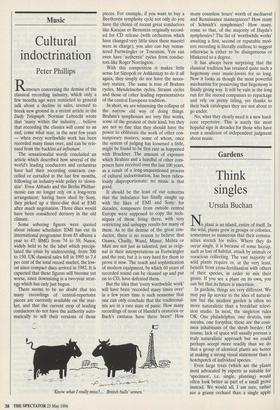Music
Cultural indoctrination
Peter Phillips
Rumours concerning the demise of the classical recording industry, which only a few months ago were restricted to general talk about a decline in sales, seemed to break new ground in a recent article in the Daily Telegraph. Norman Lebrecht wrote that 'many within the industry ... believe that recording the classics will come to an end, come what may, in the next few years — when every worthwhile work has been recorded many times over, and can be reis- sued from the backlist ad infinitum'.
The sensationalist words concluded an article which described how several of the world's leading conductors and orchestras have had their recording contracts can- celled or curtailed in the last few months, following an industry-wide policy to 'down- size'. Even Abbado and the Berlin Philhar- monic can no longer rely on a long-term arrangement: having been shed by Sony, they picked up a three-disc deal at EMI after much negotiation. Three discs would have been considered derisory in the old climate.
Some sobering figures were quoted about release schedules: EMI has cut its international programme from 85 albums a year to 47; BMG from 74 to 38; Naxos, widely held to be the label which precipi- tated the crisis by undercutting, from 300 to 150. UK classical sales fell in 1995 to 7.4 per cent of the total record market, the low- est since compact discs arrived in 1982. It is expected that these figures will become yet worse, since downsizing is a two-year strat- egy which has only just begun.
There seems to be no doubt that too many recordings of central-repertoire pieces are currently available on the mar- ket, and that the current crop of leading conductors do not have the authority auto- matically to sell their versions of those pieces. For example, if you want to buy a Beethoven symphony cycle not only do you have the choice of recent great conductors like ICarajan or Bernstein originally record- ed for CD release (with orchestras which have changed very little since these maestri were in charge), you also can buy remas- tered Furtwangler or Toscanini. You can even have 'authentic' cycles from conduc- tors like Roger Norrington.
With this competition it makes little sense for Sinopoli or Ashkenazy to do it all again, they simply do not have the neces- sary stature. The same is true of Brahms cycles, Mendelssohn cycles, Strauss cycles and those of other leading representatives of the central European tradition.
In short, we are witnessing the collapse of the narrow old way of doing things. Brahms's symphonies are very fine works, some of the greatest of their kind, but they are not so fine that they should have the power to obliterate the work of other con- temporary masters, some of whom, once the system of judging has loosened a little, might be found to be first rate as happened with Bruckner. The amount of exposure which Brahms and a handful of other com- posers have received over the last 100 years, as a result of a long-unquestioned process of cultural indoctrination, has been ridicu- lously disproportionate: no music is that good.
It should be the least of our concerns that the imbalance has finally caught up with the likes of EMI and Sony: for decades, composers from outside central Europe were supposed to copy the tech- niques of those living there, with very restricting and unhappy results for many of them. As to the demise of the great con- ductor, there is no reason to believe that Ozawa, Chailly, Wand, Masur, Mehta or Muti are not just as talented, just as origi- nal in their interpretations as Furtwangler and the rest, but it is very hard for them to prove it now. The reach and sophistication of modern equipment, by which 60 years of recorded sound can be cleaned up and put on to CD, have defeated them.
But the idea that 'every worthwhile work' will have been 'recorded many times over' in a few years time is such nonsense that one can only conclude that the traditional- ists are in a rare state of panic. How many recordings of most of Handel's oratorios or Bach's cantatas have there been? How
'Know what I really miss?... British bulls' semen.'
many countless hours' worth of mediaeval and Renaissance masterpieces? How many of Schmidt's symphonies? How many, come to that, of the majority of Haydn's symphonies? The list of 'worthwhile works' awaiting a first, second or reputable mod- ern recording is literally endless; to suggest otherwise is either to be disingenuous or blinkered to a degree.
It has always been surprising that the classical tradition has retained quite such a hegemony over music-lovers for so long. Now it looks as though the most powerful mechanism for preserving that hegemony is finally giving way. It will be vain in the long run for the record companies to repackage and rely on pretty titling, yet thanks to their back catalogues they are not about to go under.
No, what they clearly need is a new hard- core repertoire. This is surely the most hopeful sign in decades for those who have even a modicum of independent judgment about music.


























































 Previous page
Previous page